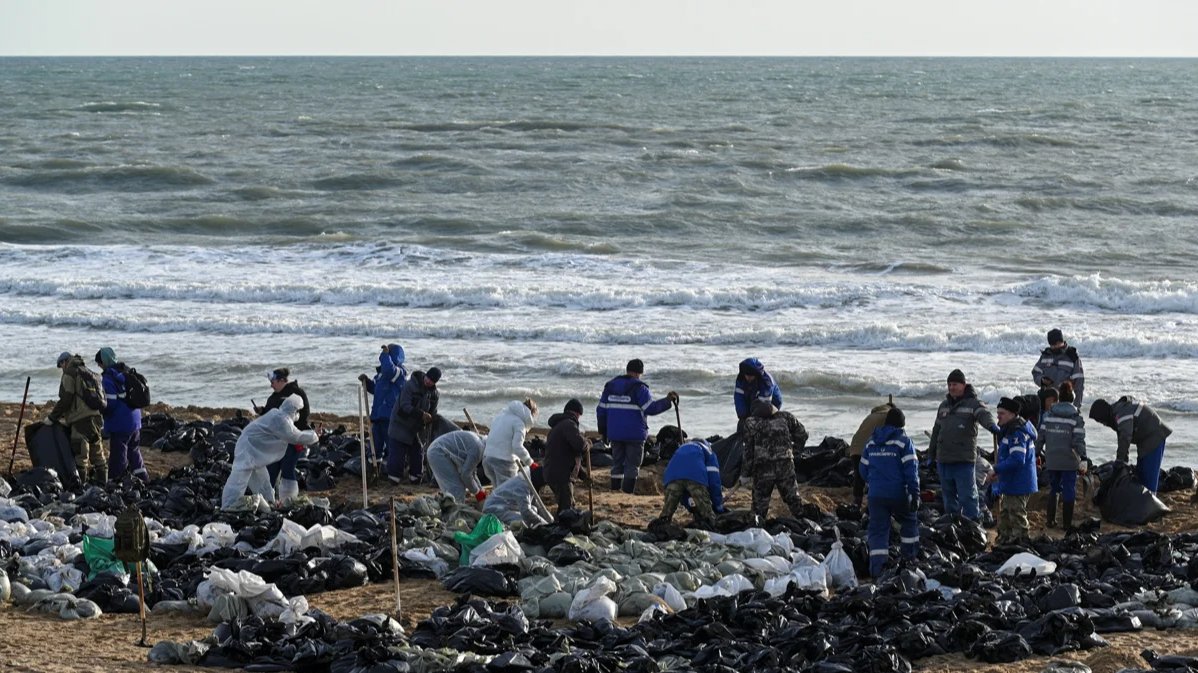Volunteers continue to clean up the Black Sea coastline after the catastrophic oil spill in the Kerch Strait earlier in December, shovelling contaminated sand and prompting complaints about the lack of proper government response to the disaster.
The Volgoneft 212 and Volgoneft 239 tankers, each reportedly carrying over 4,000 tonnes of oil, ran aground in the Kerch Strait, which runs between Russian-occupied Crimea and Russia proper, on 15 December.
The oil washed ashore soon thereafter, stretching for at least 54 kilometres across the Russian Black Sea coastline in the Krasnodar region, state-affiliated news agency Interfax estimated on Wednesday, adding that up to 23,500 tonnes of contaminated sand had been collected in the region so far.
However, volunteers previously complained that the authorities had not properly disposed of the contaminated sand — in the popular resort town of Anapa, for example, bags of oil which were not promptly removed from the Black Sea coast began to degrade and wash back out to sea due to a storm in the early hours of Monday.
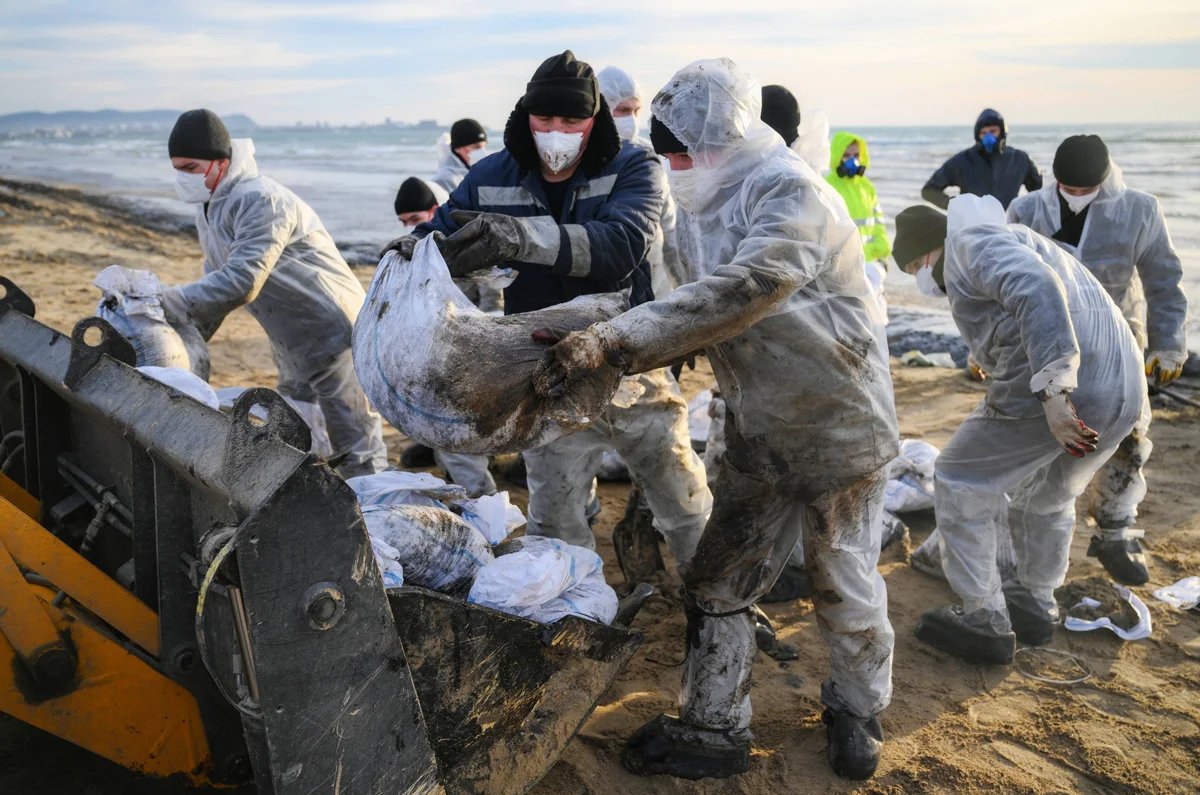
Volunteers collect sand drenched in oil, Anapa, Russia, 21 December 2024. Photo: Alexey Maishev / SNA / Scanpix / LETA
Still, local ecologist Georgy Kavanosyan, who was on site to help the volunteers late last week, says “the authorities reacted quite well”, at least in Anapa, setting up command centres on the beaches and deploying up to 100 pieces of machinery, more than they had done in similar clean-up efforts he was involved in.
Kavanosyan also said that local businesses and environmental organisations were actively involved in the clean-up effort, too, bringing volunteers protective gear and detergent to wash the birds, hundreds of which had become covered in oil after the spill. “Society is working in harmony, like an orchestra,” he said.
It’s hard to guess exactly how many birds have been affected by the spill, but experts estimate that at least 180 birds have died — they were either found dead or died of disease due to their weakened condition — and 925 were saved. Birds land along the polluted shoreline and get stuck on the oil, so it’s important to get it off them as quickly as possible.
Taisiya Katalini is a volunteer involved in the clean-up operation. She says it was a no-brainer whether to help or not when the disaster occurred.
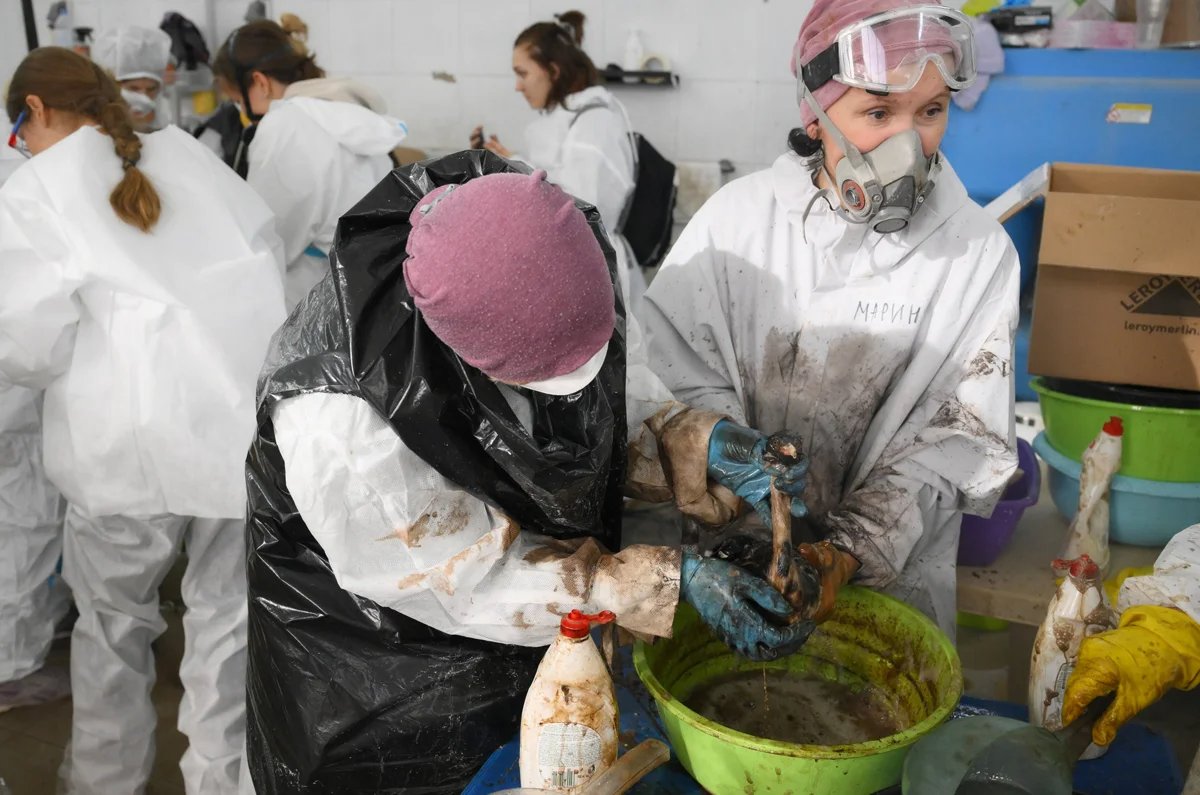
Volunteers clean birds after the Black Sea oil spill, Anapa, Russia, 21 December 2024. Photo: Sergey Pivovarov / Reuters / Scanpix / LETA
“That’s how my grandmother and mother brought me up. When something like this happens, we get up, roll up our sleeves and go and help. So when we saw in the news that there had been an oil spill, we bought shovels, gloves and buckets and went to the beach where people had been asked to help.”
But Katalini argues there is not enough machinery on the beaches. The bags of contaminated sand should be sent for disposal, she says, but the system is backed up to the point where “there are not enough bin lorries or tractors to at least drag the bags back from the coastline to stop them washing back out to sea”.
Now, all the volunteers have respirators, suits and special boots so that their entire body is protected from ingesting oil or its fumes. “On those first days, you worked in whatever you had, so people had headaches and other symptoms,” says Kavanosyan.
Volunteers have been advised to work for two hours and then take a one-hour break away from the oil spill, he adds. “Not everyone listens to the guidelines, of course, but it’s better organised every day,” Kavanosyan continues.
The main difficulty, he notes, is when volunteers have cleaned a section of the beach, only for more oil to wash ashore, meaning they need to go and clean the same spot again, which tends to deflate people.
Volunteers often suffer severe sleep deprivation and poisoning, Katalini notes. “Your liver hurts, you vomit, your head spins, you get digestive disorders,” she explains. She also feels guilt at her lack of time and inability to do more.
While there are enough volunteers in Anapa itself, the situation is more complicated on the Kerch Peninsula in annexed Crimea, where oil has also come ashore. According to satellite images, the oil has appeared in both large puddles and small droplets, over a vast area. Affected animals are already being washed on the spot, but there is still a need for more machinery and people.
Environmentalists expressed concern at a storm in the early hours of Tuesday bringing the oil to Taman Bay and the Taman-Zaporozhye reserve, where about half a million birds spend the winter.
So far, there have not been confirmed reports of oil washing ashore in the area of the reserve, but Kavanosyan warns that if a clean-up effort is needed there, it will be fraught with enormous difficulties, as it is a wild area with only five small settlements.
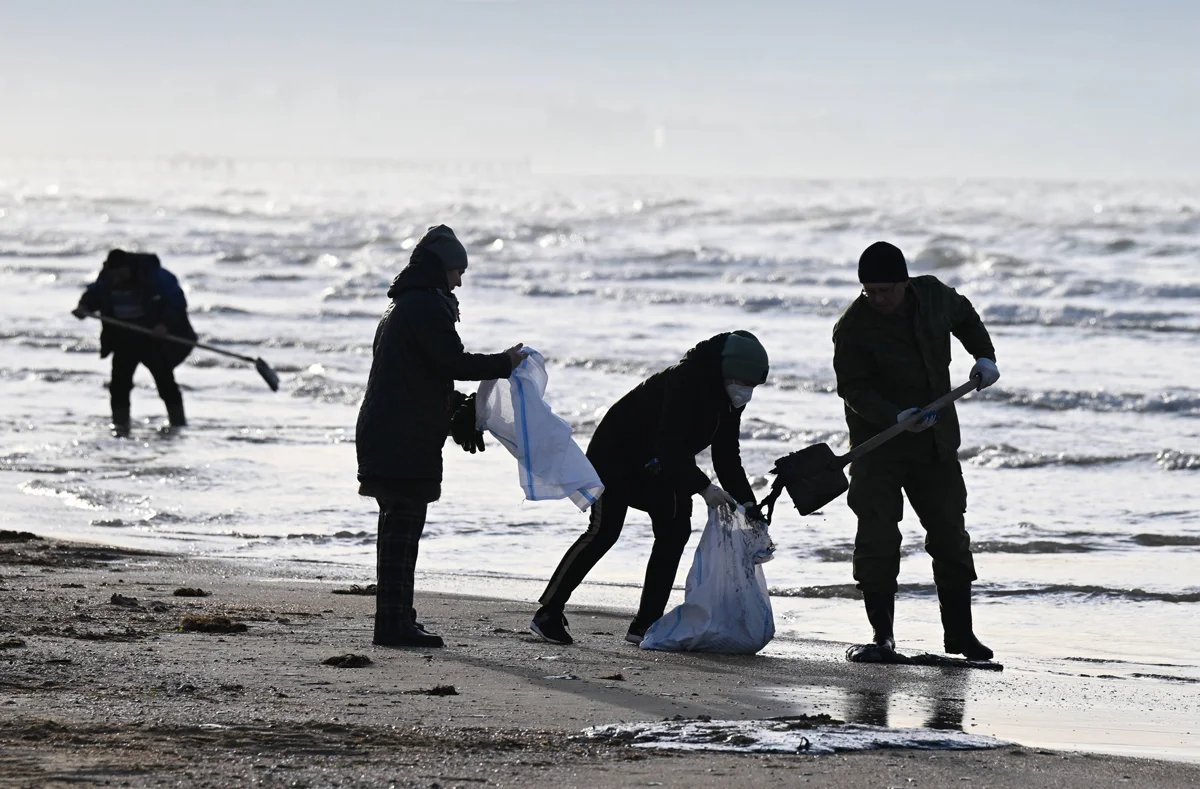
Volunteers collect sand drenched in oil after the Black Sea oil spill, Anapa, Russia, 21 December 2024. Photo: Sergey Pivovarov / Reuters / Scanpix / LETA
“We’ll help, of course, but there is no infrastructure there,” he says, which is likely to slow down the clean-up. Kavanosyan notes that speed is of the essence when cleaning the oil off the birds. “We’ll have three, five days at most to collect, wash and nurse them back to health. Any longer and the bird will probably die, whatever you do.”
Katalini says authorities had promised to install floating barriers to protect the reserve from the spill. “But they haven’t yet. If they don’t, a huge number of birds that have migrated there will die. It will be impossible to catch and wash them because of the vast area of water involved,” she says.
Over 20 dolphins were found dead along the Black Sea coastline in the Krasnodar region, the Delfa Dolphin Rescue and Research Centre reported on Wednesday. While the centre said that it looks like a mass beaching unrelated to the oil spill, it added that it would need to examine the bodies for traces of oil, which would take time.
It is difficult to say exactly how many dolphins and Azov dolphins have suffered from the tankers running aground. Kavanosyan says the bodies of dead dolphins are usually washed up on the Black Sea coast by storms. The sea is quite cold at the moment so the bodies remain in the water for a considerable amount of time.
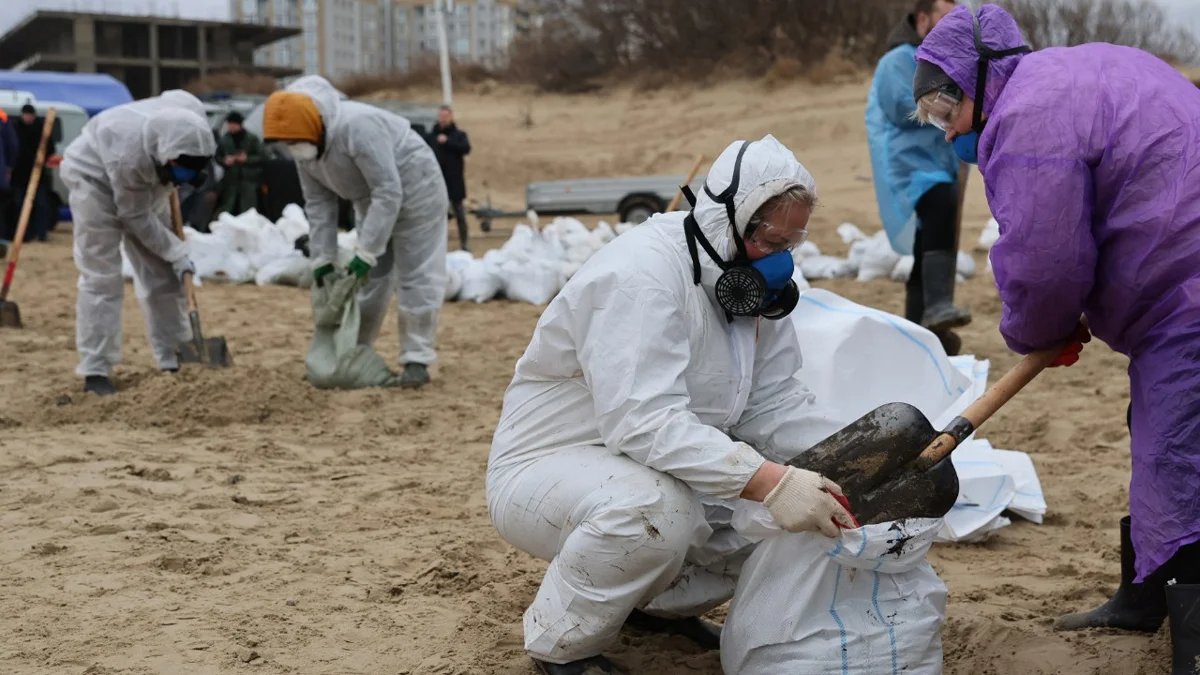
The clean-up operation on a beach in Anapa, Russia. Photo: Krasnodar region authorities, social media
“They die for different reasons. It can be due to infection, but in 70% of cases it’s from them getting caught in fishing nets. Sadly, there is a lot of fishing in the Black Sea. Dolphins try to pluck the fish out of the nets and get caught up in them themselves,” he says, after which fishermen throw them back into the water.
Kavanosyan agrees that the dolphin’s deaths are likely unrelated to the spill. “In that sense, we’ve been lucky, if I can say that at the time of such a tragedy. The fish had already migrated by the time the oil spill occurred,” he says.
While local authorities have scrambled to scale up their involvement in the clean up after Russia’s chief investigator Alexander Bastrykin ordered a criminal case to be opened into its poor organisation on Tuesday, opening headquarters in Anapa for catching and rescuing birds, and building facilities to safely store the contaminated sand, there is still a mountain to climb.
“I probably don’t see the results yet, because there is still a lot of work to be done. The beach is all pain and sadness,” Katalini says, adding that volunteers can’t work for more than two hours before feeling the adverse effects of the oil. In one day, she says, they collected “only about 30 bags. A drop in the ocean.”
Join us in rebuilding Novaya Gazeta Europe
The Russian government has banned independent media. We were forced to leave our country in order to keep doing our job, telling our readers about what is going on Russia, Ukraine and Europe.
We will continue fighting against warfare and dictatorship. We believe that freedom of speech is the most efficient antidote against tyranny. Support us financially to help us fight for peace and freedom.
By clicking the Support button, you agree to the processing of your personal data.
To cancel a regular donation, please write to [email protected]
